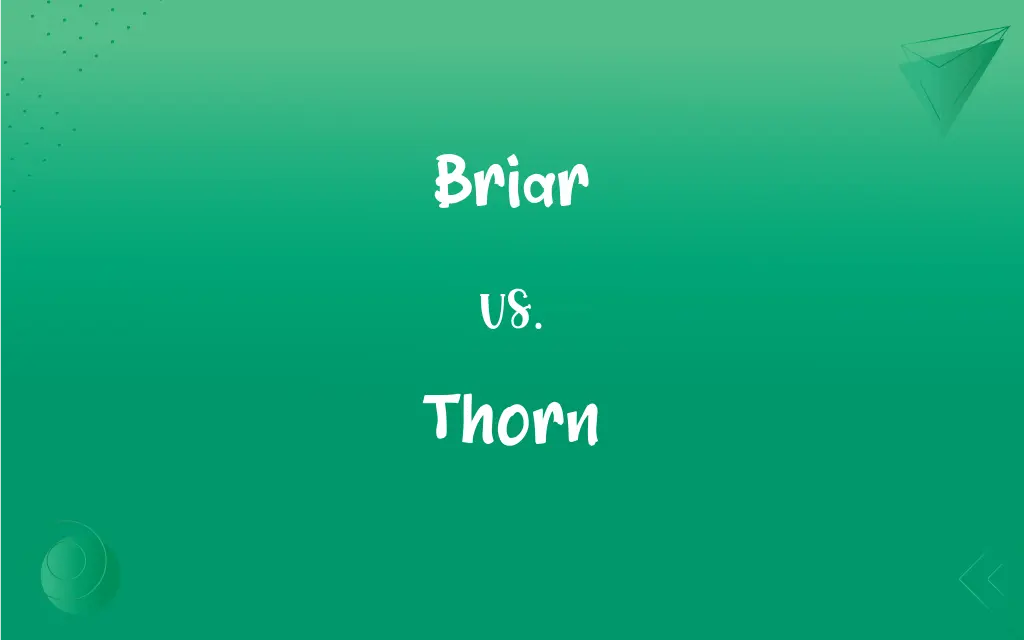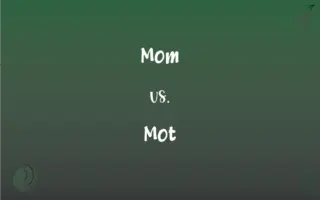Briar vs. Thorn: What's the Difference?
By Aimie Carlson & Harlon Moss || Updated on May 20, 2024
A briar is a prickly plant or shrub, often referring to specific types like wild roses, while a thorn is a sharp, pointed projection on a plant, typically found on stems or branches for protection.

Key Differences
A briar typically refers to a group of thorny or prickly plants or shrubs, such as wild roses or brambles. These plants are known for their dense, tangled growth and are often associated with challenging, untamed landscapes. A thorn, on the other hand, is a specific sharp projection that grows from a plant's stem or branch. Thorns are a form of defense mechanism that plants use to deter herbivores from eating them. While briars include entire plants, thorns are individual parts of plants.
Briars can create dense thickets that provide habitat for wildlife, whereas thorns serve primarily as protective elements on various plants, including those in briar families. Briars might have multiple thorns, but their defining feature is their overall prickly nature and dense growth.
While briars are often associated with specific plants like roses or blackberries, thorns are found across many plant species, including trees like hawthorns and shrubs like barberry. Thorns can also vary significantly in size and sharpness.
Briars are commonly found in the wild, growing vigorously in various environments, making them challenging to clear. Thorns, however, are structural features that can be seen in both wild and cultivated plants, providing defense regardless of the environment.
Comparison Chart
Definition
A prickly plant or shrub
A sharp, pointed projection on a plant
ADVERTISEMENT
Example Plants
Wild roses, brambles
Hawthorns, barberry
Primary Function
Dense, tangled growth
Defense mechanism
Habitat
Wild, untamed areas
Various environments
Structural Role
Entire plant
Part of a plant (stem/branch)
Briar and Thorn Definitions
Briar
A prickly plant or shrub.
The hikers struggled through the dense briar patch.
ADVERTISEMENT
Thorn
Can vary in size and sharpness.
The hawthorn tree has particularly long thorns.
Briar
Figuratively, something difficult or entangled.
He found himself in a legal briar.
Thorn
A modified branch in the form of a sharp woody structure.
Briar
Often refers to wild roses or brambles.
She picked blackberries from the briar.
Thorn
Any of various other sharp protuberances, such as a spine.
Briar
Any of several prickly plants, such as certain rosebushes or the greenbrier.
Thorn
Any of various shrubs, trees, or woody plants bearing such sharp structures.
Briar
A Mediterranean shrub or small tree (Erica arborea) in the heath family, whose woody roots are used to make tobacco pipes. Also called tree heath.
Thorn
Any of various sharp protuberances on an animal.
Briar
A pipe made from the root of this plant or from a similar wood.
Thorn
One that causes sharp pain, irritation, or discomfort
He is a thorn in my side.
Briar
Variant of brier1.
Thorn
The runic letter þ, used in Old English, Middle English, and Old Norse manuscripts to represent both the voiceless sound (th) of Modern English thin and the voiced sound (th) of Modern English this, and in modern Icelandic orthography to represent the voiceless sound (th).
Briar
Any of many plants with thorny stems growing in dense clusters, such as many in the Rosa, Rubus, and Smilax genera.
Thorn
(botany) A sharp protective spine of a plant.
Briar
(figurative) Anything sharp or unpleasant to the feelings.
Thorn
Any shrub or small tree that bears thorns, especially a hawthorn.
The white thorn
The cockspur thorn
Briar
The white heath (Erica arborea), a thorny Mediterranean shrub.
Thorn
(figurative) That which pricks or annoys; anything troublesome.
Briar
A pipe for smoking, made from the roots of that shrub.
Thorn
A letter of Latin script (capital: Þ, small: þ), borrowed from the futhark; today used only in Icelandic to represent the voiceless dental fricative, but originally used in several early Germanic scripts, including Old English where it represented the dental fricatives that are today written th (Old English did not have phonemic voicing distinctions for fricatives).
Briar
Same as Brier.
Thorn
To pierce with, or as if with, a thorn (sharp pointed object).
Briar
Eurasian rose with prickly stems and fragrant leaves and bright pink flowers followed by scarlet hips
Thorn
A hard and sharp-pointed projection from a woody stem; usually, a branch so transformed; a spine.
Briar
A very prickly woody vine of the eastern United States growing in tangled masses having tough round stems with shiny leathery leaves and small greenish flowers followed by clusters of inedible shiny black berries
Thorn
Any shrub or small tree which bears thorns; especially, any species of the genus Cratægus, as the hawthorn, whitethorn, cockspur thorn.
Briar
Evergreen treelike Mediterranean shrub having fragrant white flowers in large terminal panicles and hard woody roots used to make tobacco pipes
Thorn
Fig.: That which pricks or annoys as a thorn; anything troublesome; trouble; care.
There was given to me a thorn in the flesh, the messenger of Satan to buffet me.
The guilt of empire, all its thorns and cares,Be only mine.
Briar
A pipe made from the root (briarroot) of the tree heath
Thorn
The name of the Anglo-Saxon letter , capital form . It was used to represent both of the sounds of English th, as in thin, then. So called because it was the initial letter of thorn, a spine.
Briar
A tangled mass of prickly vegetation.
The briar made the garden look untidy.
Thorn
To prick, as with a thorn.
I am the only rose of all the stockThat never thorn'd him.
Briar
A common term for thorny shrubs.
The briar bushes lined the old fence.
Thorn
Something that causes irritation and annoyance;
He's a thorn in my flesh
Thorn
A sharp-pointed tip on a stem or leaf
Thorn
A Germanic character of runic origin
Thorn
A sharp, pointed projection on a plant.
She pricked her finger on the thorn.
Thorn
Typically found on stems or branches.
The rose bush had numerous thorns.
Thorn
Acts as a defense mechanism for plants.
The thorns deterred the animals from eating the plant.
Thorn
Present in various plant species.
Thorns are common in both wild and cultivated plants.
FAQs
What is a briar?
A briar is a prickly plant or shrub, often including wild roses and brambles.
Can thorns be found on trees?
Yes, trees like hawthorns have thorns.
What is the main function of a thorn?
Thorns primarily serve as a defense mechanism for plants.
Do thorns serve any purpose other than defense?
Thorns mainly provide protection but can also help in climbing for some plants.
What is a thorn?
A thorn is a sharp, pointed projection on a plant's stem or branch.
Do all briars have thorns?
Many briars have thorns, but not all thorny plants are considered briars.
Can a single plant be both a briar and have thorns?
Yes, a briar can have multiple thorns.
What plants are commonly referred to as briars?
Plants like wild roses and blackberries are commonly referred to as briars.
What is a common characteristic of briars?
Dense, prickly vegetation is a common characteristic of briars.
Are briars found only in wild areas?
Briars are commonly found in the wild but can also grow in cultivated areas.
Are briars difficult to remove?
Yes, due to their dense, tangled growth, briars can be challenging to clear.
Can thorns be removed from plants?
Thorns can be pruned, but they often grow back.
Do thorns vary in appearance?
Yes, thorns can vary in size, shape, and sharpness across different plants.
Are all thorny plants considered briars?
No, not all thorny plants are classified as briars.
What environments do briars thrive in?
Briars can thrive in a range of environments, from woodlands to scrublands.
Are thorns and spines the same?
No, thorns are modified stems or branches, while spines are modified leaves or parts of leaves.
Can thorns harm humans?
Yes, thorns can cause injury if not handled carefully.
Do thorns appear only on certain parts of a plant?
Thorns typically appear on stems, branches, or leaves.
Do briars flower?
Yes, many briars, like wild roses, produce flowers.
Are briars beneficial for wildlife?
Briars can provide habitat and protection for various wildlife species.
About Author
Written by
Aimie CarlsonAimie Carlson, holding a master's degree in English literature, is a fervent English language enthusiast. She lends her writing talents to Difference Wiki, a prominent website that specializes in comparisons, offering readers insightful analyses that both captivate and inform.
Co-written by
Harlon MossHarlon is a seasoned quality moderator and accomplished content writer for Difference Wiki. An alumnus of the prestigious University of California, he earned his degree in Computer Science. Leveraging his academic background, Harlon brings a meticulous and informed perspective to his work, ensuring content accuracy and excellence.































































